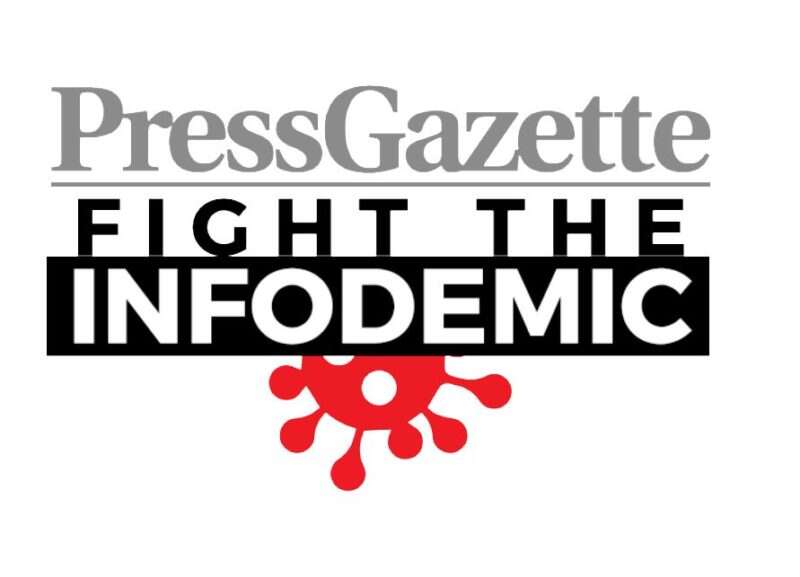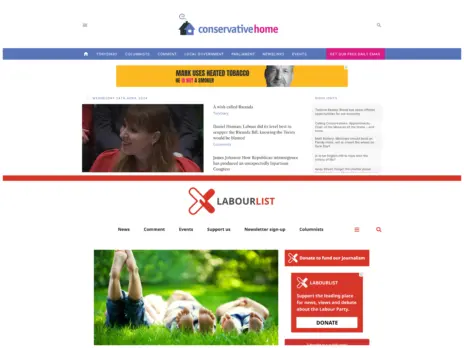
People who rely on social media for information about coronavirus are more likely to believe conspiracy theories and breach lockdown rules, according to a study.
More than one in 20 (8%) think the symptoms that most individuals blame on Covid-19 appear to be connected to 5G network radiation – a false conspiracy that is thought to have motivated a number of mobile mast attacks across the country during lockdown.
Of those who believe this theory, 60% said they get their information from YouTube, compared with 14% who think that it is false.
On Facebook, the number stands at 54% among believers, versus 20% of non-believers.
Press Gazette has been investigating social media companies’ failure to tackle misinformation about Covid-19 as part of our Infodemic campaign.
This title believes that the promotion of unverified news on social media has become a life and death issue and that social media giants now have a duty to promote evidence-based journalism and to stop spreading misinformation.
 Among those who believe there is no hard evidence that the virus exists, 56% use Facebook as their key information source, almost three times higher than the proportion of people who do not believe such a thing (20%).
Among those who believe there is no hard evidence that the virus exists, 56% use Facebook as their key information source, almost three times higher than the proportion of people who do not believe such a thing (20%).
“These sort of associations cannot prove that misinformation on social media platforms causes belief in conspiracies, lower trust and a greater likelihood of breaking the rules, but they point to a toxic mix between underlying beliefs and misleading information that can have real effects on how people behave, even during a pandemic,” said Professor Bobby Duffy, director of the Policy Institute at King’s College London.
The findings, based on surveys of 2,254 UK residents aged between 16 and 75 carried out by King’s College London and Ipsos Mori, also suggest a link between those who have broken lockdown rules and use social media for details about coronavirus as well.
Three in 10 people who wrongly believe that 5G is causing Covid-19 symptoms have gone outside despite suspecting they may have the virus, compared with just 4% among those who reject this belief.
People who admitted going outside with possible symptoms are more than three times as likely as those who have not to get a fair amount or great deal of their information about the virus from YouTube.
Meanwhile, 55% of Facebook-reliant users said they took the risk, compared with 21% who did not.
The results indicate a similar trend among those having friends or family over during lockdown, as well as failing to stick with two-metre distancing rules.
“Our findings suggest that social media use is linked both to false beliefs about Covid-19 and to failure to follow the clear-cut rules of the lockdown,” said Dr Daniel Allington, senior lecturer in social and cultural artificial intelligence at King’s College London.
“This is not surprising, given that so much of the information on social media is misleading or downright wrong.
“Now that some of the lockdown rules are being relaxed, people will have to make more and more of their own decisions about what is safe or unsafe – which means that access to good-quality information about Covid-19 will be more important than ever.
“It’s time for us to think about what action we can take to address this very real problem.”
A YouTube spokeswoman said: “We’re committed to providing timely and helpful information about Covid-19 during this critical time, including raising authoritative content, reducing the spread of harmful misinformation and showing information panels, using WHO data and the NHS resources, to help combat misinformation.
“We also have clear policies that prohibit videos promoting medically unsubstantiated methods to prevent the coronavirus in place of seeking medical treatment, and we quickly remove videos violating these policies when flagged to us.”
Facebook responded: “We have removed hundreds of thousands of Covid-19-related misinformation that could lead to imminent harm including posts about false cures, claims that social distancing measures do not work, and that 5G causes coronavirus.
“During March and April, we put warning labels on about 90 million pieces of Covid-19-related misinformation globally, which prevented people viewing the original content 95% of the time.
“We have also directed more than 3.5 million visits to official Covid-19 information and lockdown measures from the NHS and the Government’s website, directly from Facebook and Instagram.”
Email pged@pressgazette.co.uk to point out mistakes, provide story tips or send in a letter for publication on our "Letters Page" blog






